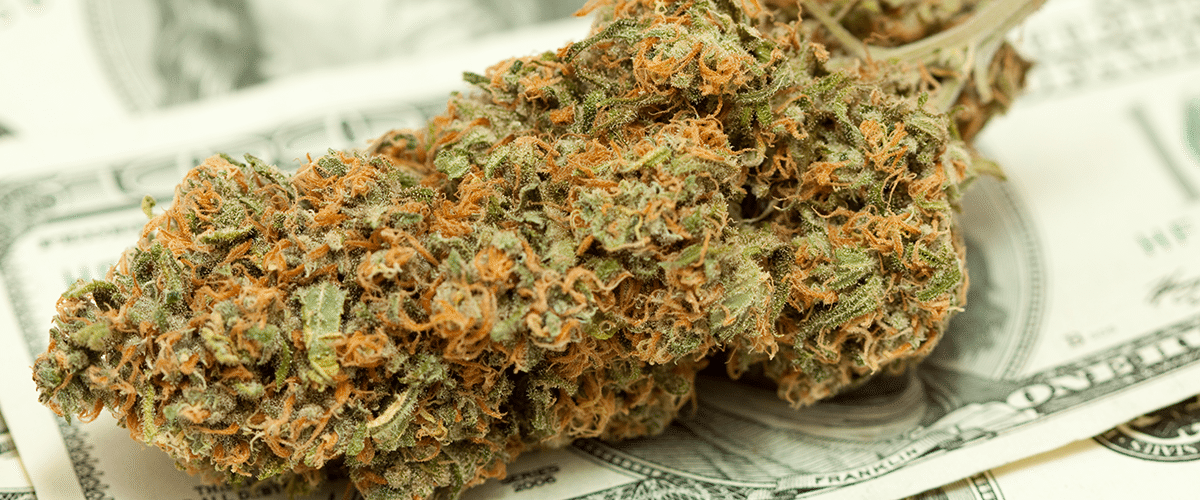[vc_row][vc_column][vc_column_text]
A federal crackdown on states that have passed adult use marijuana laws would jeopardize billions in revenue and thousands of jobs.
Enforcement of federal laws against marijuana by the current administration would jeopardize $2.5 billion in projected revenue this year alone and $8.6 billion by 2020, according to cannabis market research firm New Frontier Data.
Since 1970, marijuana has been federally prohibited and scheduled as a Schedule I substance. Since then, however, eight states have legalized recreational marijuana – four in last November’s election alone. A recent report projected that the U.S. legal cannabis market, which generated $6.7 billion in sales in 2016, will grow to $24.5 billion by 2025 and generate hundreds of thousands of jobs.
“Just yesterday, we released our projections that the cannabis sector could create almost 300,000 jobs by 2020,” said New Frontier CEO and Founder Giadha Aguirre DeCarcer, in a statement, “and it goes without saying that adult use cannabis factors significantly in that number. Adult use is now legal in eight states, including the District of Columbia, covering a population of 69 million people, nearly one-fifth of the U.S. population.”[/vc_column_text][/vc_column][/vc_row][vc_row][vc_column][vc_single_image image=”17394″ img_size=”1200×250″ onclick=”custom_link” img_link_target=”_blank” link=”https://www.medicalmarijuanainc.com/report-u-s-legal-cannabis-market-growing-faster-dot-com-boom/”][/vc_column][/vc_row][vc_row][vc_column][vc_column_text]President Obama’s administration had a hands-off approach to cannabis prosecutions, electing not to enforce federal laws against businesses and individuals that operated in accordance to their state’s laws.
Last month in a press conference, however, White House Press Secretary Sean Spicer said that he expects there to be “greater enforcement” of federal law by the Department of Justice against states that have passed recreational marijuana laws. Spicer added that President Trump sees “a big difference” between using marijuana for medical purposes and recreationally.
“[Press Secretary Spicer] also discussed the growing opioid epidemic in the country and how recreational cannabis encourages drug use. However, according to a study released last year by John Hopkins University, states with ‘medical cannabis laws were associated with a 24.8% lower annual rate of opioid analgesic overdose deaths compared with states without laws. In 2010, this translated to an estimated 1,729 fewer deaths than expected,” DeCarcer added.[/vc_column_text][/vc_column][/vc_row][vc_row][vc_column][vc_single_image image=”17320″ img_size=”1200×250″ onclick=”custom_link” img_link_target=”_blank” link=”https://www.medicalmarijuanainc.com/majority-americans-believe-not-worth-cost-enforce-marijuana-prohibition-poll-finds/”][/vc_column][/vc_row][vc_row][vc_column][vc_column_text]The nation’s legal cannabis industry is currently outpacing the growth of the 2000s dot-com boom. Colorado, the nation’s oldest recreational cannabis market, generated $1.3 billion in marijuana sales in 2016. Washington’s recreational sales in 2016 doubled that of the year prior, and the since last October, the state overtook Colorado in monthly cannabis sales.
“In the first week of February alone, retailers in Washington state sold $30.5 million worth of cannabis products reflecting the high demand for cannabis in legal markets,” said DeCarcer.
California is one of the four states that approved recreational marijuana measures in the last election and have yet to implement its regulated market. The West coast state alone is expected to pull in $1.6 billion in its first year of recreational sales, once regulated transactions begin in 2018, and eventually balloon to $6.46 billion by 2020. Lawmakers in more states are already moving toward adult use legalization.
“Legal cannabis has been one of the fastest growing industries in the country for the past three years and any disruptions would substantially impact the economic activity stemming from this industry,” said DeCarcer.
U.S. Attorney General Jeff Sessions, despite recently remarking that he is “dubious about marijuana,” did provide some private assurances to Senators before he was confirmed that he had not yet considered a major shift in enforcement.
Regardless of whether the federal government enforces laws against recreational marijuana, Medical Marijuana, Inc. and its cannabidiol (CBD) hemp oil products would remain unaffected. CBD hemp oil is excluded from the Controlled Substances Act and therefore legal to purchase and use in all 50 U.S. states. You can learn more about our available CBD hemp oil products here.[/vc_column_text][/vc_column][/vc_row][vc_row][vc_column][vc_single_image image=”17466″ img_size=”1200×250″ onclick=”custom_link” img_link_target=”_blank” link=”https://www.medicalmarijuanainc.com/what-is-cbd-hemp-oil/”][/vc_column][/vc_row]






